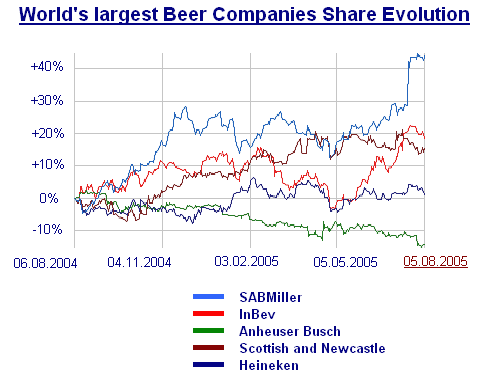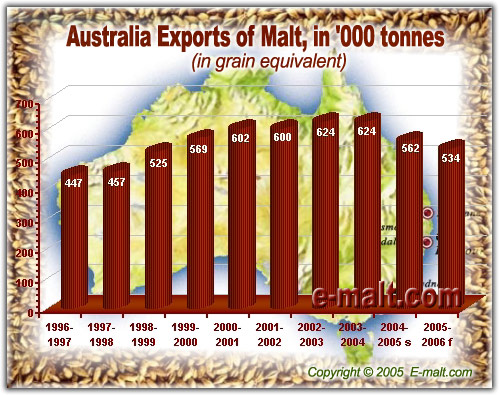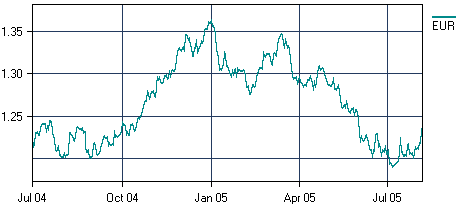 Spain: InBev sells its stake in Spanish Brewer Damm
World’s leading beer maker by volumes, InBev S.A. announced on August 5 that it has reached an agreement
Spain: InBev sells its stake in Spanish Brewer Damm
World’s leading beer maker by volumes, InBev S.A. announced on August 5 that it has reached an agreement to sell the totality of its 12.02% minority stake in the Spanish brewer Damm S.A. (“Damm”) for a minimum cash consideration of 176 million euro. InBev remains active in the Spanish beer market through its existing wholly-owned subsidiary which imports a number of InBev’s leading brands including Beck’s®, Stella Artois® and Franziskaner®.
InBev has agreed to sell 5,328,864 shares at a price of 33 euro per share. An additional amount may be payable conditional on Damm’s financial performance in 2005. InBev expects that the final consideration received will represent an Enterprise Value/2004 EBITDA multiple of between 11.5 and 12.5 times.
InBev acquired its minority stake in Damm for 84 million euro in 2002, when the Spanish regulatory authorities obliged Group Mahou/San Miguel to dispose of its stake in Damm. The sale will result in a capital gain, which will be shared equally with Group Mahou/San Miguel in accordance with the agreement signed in 2002.
The sale of this minority stake in Spain is fully in line with InBev’s objective of freeing up capital to focus resources on critical strategic initiatives. John Brock, InBev CEO, commented: “The sale of our stake in Damm is one more example of our increased discipline in capital allocation.”
...
more info
 Italy: Beer consumption decreased two years in a row due to the excise rise
Italian beer consumption has decreased by 2.2% in the first half of 2005, compared to the same period last year and fell by 7% over the first half of 2003.
Italy: Beer consumption decreased two years in a row due to the excise rise
Italian beer consumption has decreased by 2.2% in the first half of 2005, compared to the same period last year and fell by 7% over the first half of 2003. The figures were reported on August 3 in a statement by Assobirra, the Association of Italian Brewers. "This is a very disturbing trend which is in sharp contrast to what is happening for other summer beverages," observed Assobirra Chairman Piero Perron.
Assobirra pointed out a 9% consumption decline in July 2005, which is minus 14 million litres compared to July 2004. Beer consumption in July decreased by 19 % in comparison to July 2003 that is 35 million litres less. 17 million litres less beer were sold between January and July 2005 in Italy compared to the same period in 2004 and 58 million litres less compared to the first half of 2003.
Italian beer sales have dropped by 58 million litres in 2004 compared to 2003.
"It's a worrying trend, opposite to the summer one of other beverages. Yet 68 % of Italians declare they drink beer and appreciate its qualities and nutritional factors. In fact, 38 % know it’s a low calory drink. The consumption drop is due to the excise rise, which raised the cost of beer, right in the middle of a tight economic situation for the Italians" said Assobirra president Piero Perron.
...
more info
 Russia : Russians help BBH to steppe up beer sales in Q2 and H1 2005
Baltic Beverages Holding AB (BBH) announced on August 3 its first half and second quarter 2005 results (April to June 2005).
Russia : Russians help BBH to steppe up beer sales in Q2 and H1 2005
Baltic Beverages Holding AB (BBH) announced on August 3 its first half and second quarter 2005 results (April to June 2005).
- Total volume growth of 14% to 1973 ML
- Russian market share of 36.3%
- Net sales up 18.6% in EUR, up 24.0% in USD
- EBIT up 32.6% in EUR, up 38.6% in USD
- Strong cash flow performance
The results for the first half show a continuation of the strong growth in both volumes and net sales shown in the second half of 2004, following the management initiatives within sales and marketing.
The momentum shown in the second half of 2004 has continued into 2005 with BBH gaining share in all segments of the Russian market and achieving local price increases in line with Food and Beverage inflation. The sales growth in the second half of the year will be less pronounced as the performance in the second half of 2004 was boosted by the sales and marketing initiatives developed in 1H04. The previous guidance of broadly flat EBIT margins for the full year is maintained.
- BBH total beer volumes of 1894ML, up 14%:
- BBH Russia, up 17%
- BBH Ukraine, down 1%
- BBH Baltics, up 6%
- BBH Kazakhstan, up 61%
Russian market share 36.3%, up 4.1%pts; comparable to the last two quarters of 2004
...
more info
 Czech Republic: Plzensky Prazdroj plans large-scale reconstruction
The main production facility of brewery Plzensky Prazdroj in Plzen will undergo a large-scale reconstruction in the next few years,
Czech Republic: Plzensky Prazdroj plans large-scale reconstruction
The main production facility of brewery Plzensky Prazdroj in Plzen will undergo a large-scale reconstruction in the next few years, Prague Monitor Daily communicated on August 3. Prazdroj CEO Mike Short told CTK that investments in the business year ending in March 2006 will exceed last year's CZK 1.6 billion.
Prazdroj CEO Mike Short assumed his post in February 2005. He said he sees Prazdroj and its key product, Pilsner Urquell beer, as the flagship of SABMiller, the world's No. 2 brewer.
The company will invest over CZK 1 billion in a new bottling plant. It will also add ten new tanks for fermentation to the existing 150, and extend its brewing facility. "By the end of the year, a plan enabling the full use of the 58-hectare compound will be drawn up and will be taken into account in the reconstruction," spokesman Alexej Bechtin said.
Last year, Prazdroj sold 9.7 million hectolitres of beer, up 200,000 hectolitres against the previous year. It should produce slightly under 10 million hectolitres this year, according to Short. Last year's exports totaled 1.7 million hectolitres, a growth of 13 percent from 2003, and the increase should be even bigger this year. Licenced production in Slovakia, Poland, and Russia surpassed one million hectolitres last year. This year, Prazdroj also launched licenced production in Hungary. Production under licence should increase by 300,000 hectolitres this year.
...
more info
 Latin America: Purchase of shares of Quilmes International (Bermuda) Ltd.
Quilmes Industrial (Quinsa) S.A. announced on August 4 that it has entered into an agreement with its controlling shareholders,
Latin America: Purchase of shares of Quilmes International (Bermuda) Ltd.
Quilmes Industrial (Quinsa) S.A. announced on August 4 that it has entered into an agreement with its controlling shareholders, Beverage Associates (BAC) Corp. and Companhia de Bebidas das Americas - AmBev, pursuant to which it has agreed to purchase from BAC its 5.32% equity interest in Quinsa's subsidiary, Quilmes International (Bermuda) Ltd (QIB). The purchase price for the QIB shares will be determined pursuant to a formula that calculates the value of QIB based on QIB's audited financial statements for the year ended December 31, 2005. Under this formula, QIB will be valued at 6 times QIB's EBITDA for 2005 less QIB's net debt as of the end of 2005. The estimated purchase price is $110 million. Upon completion of this transaction, Quinsa will own 92.95% of QIB and AmBev will own the remaining 7.05%.
Quinsa expects to acquire title to BAC's QIB shares and to deposit the estimated purchase price into an escrow account within approximately 30 days. Once the final purchase price is determined and certain other conditions are satisfied, the escrowed funds will be released to BAC and Quinsa and BAC will make any payments necessary to reflect any difference between the funds released to BAC and the final purchase price plus interest thereon (accrued at a rate of LIBOR plus 2%) from the fifth business day after the date hereof until the full purchase price is paid to BAC.
The agreement also amends certain other provisions of the existing stock purchase agreement between BAC and AmBev.
...
more info
 Malt News
Malt News 
 EU: EU malt exporters booked licences for 180,000 tonnes in July
EU malt exporters booked licences for 180,000 tonnes in July. Converted to a year’s figure, it would be close to 2.2 million tonnes.
EU: EU malt exporters booked licences for 180,000 tonnes in July
EU malt exporters booked licences for 180,000 tonnes in July. Converted to a year’s figure, it would be close to 2.2 million tonnes. Such figure matches the EU malt exports of the past crop year. Exports had declined by 300,000 tonnes, and so far nothing points to an improvement in the new season, analysts said. Exports may further decline to Russia, Japan, Thailand, losses should be compensated by larger sales to Latin America, Africa and Southeast Asia except Thailand.
Most domestic EU business was done before July. This month activity in the U.K. was lively, prices better than on the Continent. British maltsters concentrate more and more on their local market, as their cost to export points puts them in an unfavourable position vis-a-vis their Continental colleagues.
 Barley News
Barley News 
 Australia: Crop estimates now range from 7.0 to almost 8.0 million tonnes
Crop estimates now range from 7.0 to almost 8.0 million tonnes. Beneficial rainfalls continued during the month, in some places they were overabundant.
Australia: Crop estimates now range from 7.0 to almost 8.0 million tonnes
Crop estimates now range from 7.0 to almost 8.0 million tonnes. Beneficial rainfalls continued during the month, in some places they were overabundant. In South Australia and Victoria planting was finally only two to four weeks late, crops are looking fine today. In NSW the rains since end June provided for further delays, which led to an increase of barley acres, when farmers considered the time had past for seeding of wheat.
Stocks of old crop barley have reached a bottom. It may well be that Australia brings in a large barley crop, but it requires constant rainfalls and moderate temperatures in view of low subsoil moisture and the late planting. One state, Western Australia, has enjoyed almost optimal conditions all season long.
 USA: Barley prices still pressured by carryover stocks and high-energy costs
The malting barley industry is still pressured by the carryover supplies that have accumulated over the past few years;
USA: Barley prices still pressured by carryover stocks and high-energy costs
The malting barley industry is still pressured by the carryover supplies that have accumulated over the past few years; by the high-energy costs, especially natural gas; and as well because of the light beer craze, Farm & Ranch Guide posted on August 03. Marv Zutz, executive director of the Minnesota Barley Growers Association, predicts the situation isn't going to change anytime soon.
"What's happening is the industry is still grinding through the 2003 crop and has not really started to get into the 2004 crop, let alone have to worry about the 2005 crop," Zutz said. "There is plenty of stocks on hand and also it appears there will be stocks of malting barley in Canada as well, which will place extra pressure on the malting barley prices."
"The malt industry is being pressured by the high energy costs, especially natural gas," he noted. "Also, because of the light beer craze, the calorie craze, it only takes 75 % of the barley to produce the same amount of beer as we did 10 years ago. So we are putting out the same amount of beer, but we aren't using the same amount of barley to make that beer. And that's primarily because of new efficiencies in the brewing process and also because of the light beer and low calorie products."
...
more info
 Hops News
Hops News 
 Europe: Joh. Barth & Sohn GmbH & Co. KG evaluates European hops growth as normal
The European hop growing areas report normal
Europe: Joh. Barth & Sohn GmbH & Co. KG evaluates European hops growth as normal
The European hop growing areas report normal growing conditions, Joh. Barth & Sohn GmbH & Co. KG, the agricultural company that processes and trades hops and hop products worldwide reported at the beginning of July 2005.
The growth delay caused by cool climatic conditions in early May was completely compensated by the end of June. The plants have reached full trellis height. Some varieties have already started with the early stage of flowering. Rain at the end of June and in early July brought the necessary humidity and provides for further healthy plant development. There have been no visible problems with pests and diseases up to now.
In Poland, Czech Republic and Slovenia plant growth is average to good. Joh. Barth & Sohn GmbH & Co. KG assumes that some hops from these countries will be used to balance the deficit in German aroma hops (e.g. Aurora, Marynka).
Joh. Barth & Sohn GmbH & Co. KG notifies also that the Slovenian variety known as "Super Styrian" will only be certified as "Aurora" by the authorities, as this is the correct botanical name.















 Currency Rates
Currency Rates 

 Top Industry News
Top Industry News 
 More News
More News 
 Brewery News
Brewery News 










 Spain: InBev sells its stake in Spanish Brewer Damm
...
Spain: InBev sells its stake in Spanish Brewer Damm
...
 EU: EU malt exporters booked licences for 180,000 tonnes in July
EU: EU malt exporters booked licences for 180,000 tonnes in July
 Australia: Crop estimates now range from 7.0 to almost 8.0 million tonnes
...
Australia: Crop estimates now range from 7.0 to almost 8.0 million tonnes
...
 UK: Barley quality is good
...
UK: Barley quality is good
... Malt News
Malt News 